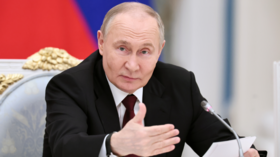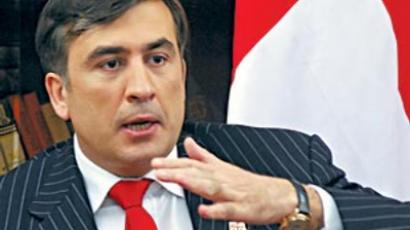Georgian poverty crisis deepens
Hit by the financial and political crisis, and the effects of the South Ossetian war – Georgians are experiencing deepening poverty and unemployment. Living standards are plummeting and many are unable to make ends meet.
Anzor Vahtangashwili and his family live in what used to be a hospital room. Until last year’s South Ossetian war the history teacher owned three houses and was amongst the wealthiest in his village not far from Tskhinval.
However, that village was razed to the ground and today Anzor owns next to nothing. He manages to scrape by working as a security guard.
It has been nine months since the war and refugees like him say they have been forgotten by their government.
“What did we get? We got two beds, we got two mattresses, we got a heater. The government gives each person 24 laris – about $14- a month to live on. Oh yes, we get bread, and once a month we get basic food like noodles,” Anzor confessed.
Anzor’s son Giorgi lost his childhood when war came to Tskhinval. He is saving his pocket money to buy building materials for when the family eventually returns home.
“When we go back and everything is burnt, my father will need my money to rebuild the house. I miss our home so much – most of all I miss my dog and parrot,” the boy said.
When Anzor leaves for his 24-hour shift he meets other refugees in the hallway, displaced like him but not as lucky to have work. On the other side of the hospital grounds, the reality is not much better
The number of those living below the poverty line is rapidly increasing. It has been steadily climbing since the collapse of communism and it shows no sign of letting up.
It takes Givi Tsintsadze an hour to get to work each morning, but his destination is not a fancy office or an industrial estate. Instead it is a piece of pavement on a busy Tbilisi intersection. This is where out-of-work electricians, jobless plumbers, and redundant factory workers come each day to beg for work.
Whenever a driver stops, within seconds he’s bombarded with fathers desperate to provide for their families.
“I have a wife and child and it’s impossible to support them. I haven’t had a job in ten days. I’m a painter and while before the war with Russia, there wasn’t much work, I could at least get by,” Givi explained.
“But since then things have gotten so much worse. More and more people are coming on to the streets looking for work,” he added.
Last year’s war, compounded with the global financial meltdown, has seen many Georgians left destitute.
Many of the country’s banks are now struggling to survive. The government has pinned its hopes on the four-and-a-half billion dollars promised by donor countries – a figure that economists say could help Georgia bear the brunt of it.
Professor Vladimir Papava, an economist, commented on the situation:
“Now Georgia maintains its economic stability by using this financial aid. So, under the global financial crisis there are many countries that need international financial support, it’s not easy for them to get some financial support because of the global crisis,” he said.
“But because Georgia was under Russian aggression it promoted Georgia to get some financial support which means it was a paradox of the war,” he added.
While ministers promise that most of the money will be used for rebuilding infrastructure such as roads and bridges, for people here there’s little optimism that they’ll ever see a penny of it.












